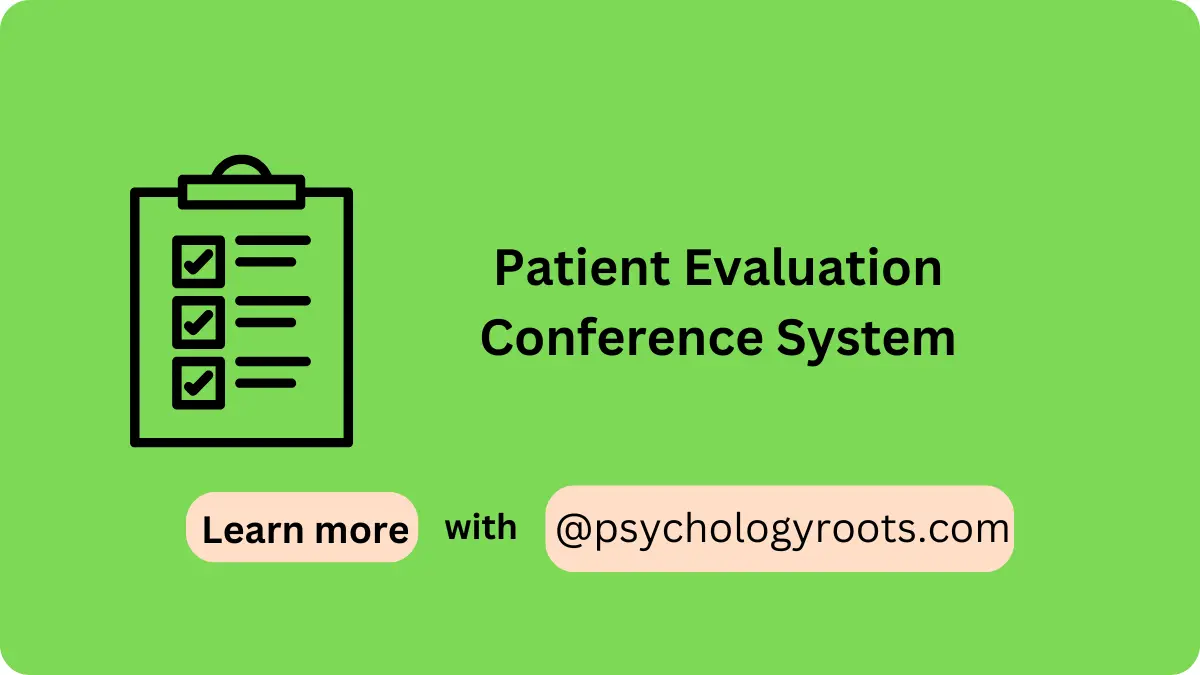Table of Contents
Patient Evaluation Conference System
Here in this post, we are sharing the “Patient Evaluation Conference System”. You can read psychometric and Author information. We have thousands of Scales and questionnaires in our collection (See Scales and Questionnaires). You can demand us any scale and questionnaires related to psychology through our community, and we will provide you with a short time. Keep visiting Psychology Roots.
About Patient Evaluation Conference System
Scale Name
Patient Evaluation Conference System
Author Details
Richard F. Harvey and Hollis M. Jellinek
Translation Availability
English

Background/Description
The Patient Evaluation Conference System (PECS), developed by Richard F. Harvey and Hollis M. Jellinek in 1981, is a 79-item clinician-rated scale designed to assess the functional and psychosocial status of rehabilitation patients. Published in Archives of Physical Medicine and Rehabilitation, the PECS is used to define treatment goals and evaluate progress in multidisciplinary rehabilitation settings. It covers 15 functional domains, including motor control, self-care (e.g., dressing, feeding), mobility (e.g., transfers, ambulation), communication (e.g., speech, comprehension), cognition (e.g., memory, problem-solving), social interaction, family support, and vocational skills, plus three case conference sections. The design emphasizes sensitivity to minor functional changes, multidisciplinary scope, and simplicity in application, scoring, and interpretation.
Each item is rated by the responsible staff member (e.g., physical therapist, psychologist) on an 8-point scale (0 = unmeasured/unmeasurable, 7 = full independence), with a threshold of 5 distinguishing independence (with/without aids) from needing human assistance. Some items use 4-point scales. Scores are collated onto a master form for case conferences to track progress. The PECS was validated with 125–200 rehabilitation patients (mean age ≈ 40–70 years, mixed gender, U.S.-based, e.g., stroke, brain injury). It correlates with the Functional Independence Measure (FIM; r ≈ 0.70–0.85) and Brief Symptom Inventory (r ≈ 0.38–0.47). The PECS is used in rehabilitation medicine, clinical psychology, and multidisciplinary care to monitor functional and psychosocial outcomes. Access requires permission from Archives of Physical Medicine and Rehabilitation or the authors.
Administration, Scoring and Interpretation
- Obtain the PECS from Harvey and Jellinek (1981) or authorized sources (e.g., Archives of Physical Medicine and Rehabilitation), ensuring ethical permissions.
- Explain to participants (adults in rehabilitation) or caregivers that the scale assesses functional and psychosocial status, emphasizing confidentiality and voluntary participation.
- Administer the 79-item scale in a rehabilitation setting via observation and interviews by the relevant staff member for each domain, rating based on current performance.
- Estimated completion time is 20–30 minutes, depending on patient complexity.
- Ensure a private, supportive environment; provide rehabilitation or mental health resources (e.g., support services) and adapt for accessibility (e.g., clear instructions) if needed.
Reliability and Validity
The PECS demonstrates acceptable psychometric properties (Harvey & Jellinek, 1981; Silverstein et al., 1991). Inter-rater reliability ranges from r = 0.68–0.80 across sections (N = 125). Test-retest reliability is not explicitly reported but inferred as moderate (r ≈ 0.65–0.80) based on similar scales. Internal consistency is not specified but estimated as moderate to high (Cronbach’s alpha ≈ 0.75–0.85) due to domain structure.
Convergent validity is supported by correlations with the Brief Symptom Inventory (r = 0.38–0.47 for self-care, mobility, communication; N = 22) and depression scores (r = 0.37–0.39 for bladder/skin care; N = 28). Factor analysis (N not specified) identifies eight factors (cognition, motor control, self-care, communication, impairment, assistive devices, social interaction, family support), with motor, self-care, and impairment scales fitting a unidimensional Rasch model.
Criterion validity is evidenced by 75% accuracy in categorizing rehabilitation program levels (N not specified) and sensitivity to recovery patterns in head trauma patients (N = 30) via CT scan comparisons. Pairing with the FIM or Barthel Index enhances comprehensive assessment.
Available Versions
79-Items
Reference
Harvey, R. F., & Jellinek, H. M. (1981). Functional performance assessment: a program approach. Archives of physical medicine and rehabilitation, 62(9), 456-460.
Important Link
Scale File:
Frequently Asked Questions
What does the Patient Evaluation Conference System measure?
It measures functional and psychosocial status across motor, self-care, communication, cognition, and social domains in rehabilitation patients.
Who is the target population?
Adults in rehabilitation settings (e.g., stroke, brain injury).
How long does it take to administer?
Approximately 20–30 minutes.
Can it inform interventions?
Yes, it defines treatment goals and monitors progress in multidisciplinary rehabilitation.
Disclaimer
Please note that Psychology Roots does not have the right to grant permission for the use of any psychological scales or assessments listed on its website. To use any scale or assessment, you must obtain permission directly from the author or translator of the tool. Psychology Roots provides information about various tools and their administration procedures, but it is your responsibility to obtain proper permissions before using any scale or assessment. If you need further information about an author’s contact details, please submit a query to the Psychology Roots team.
Help Us Improve This Article
Have you discovered an inaccuracy? We put out great effort to give accurate and scientifically trustworthy information to our readers. Please notify us if you discover any typographical or grammatical errors.
Make a comment. We acknowledge and appreciate your efforts.
Share With Us
If you have any scale or any material related to psychology kindly share it with us at psychologyroots@gmail.com. We help others on behalf of you.